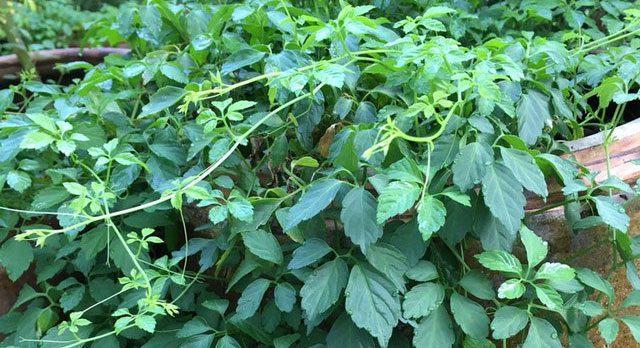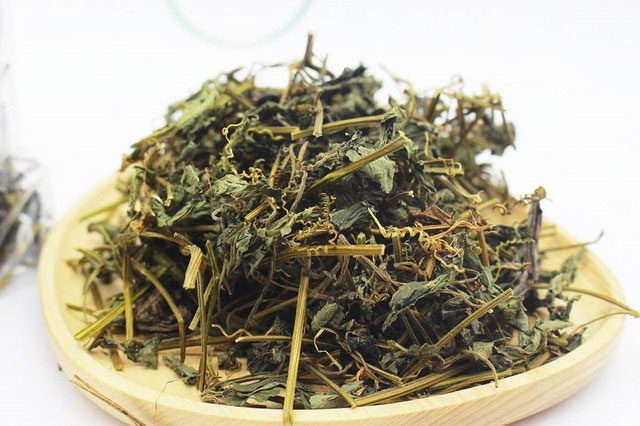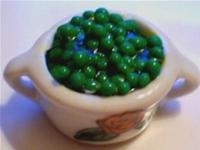This is a valuable medicinal herb commonly found in the mountainous provinces of Vietnam.
Benefits of Gynostemma You May Not Know
Gynostemma is a plant belonging to the gourd family, scientifically known as Gynostemma pentaphylium. It is also known by various names such as Jiaogulan, Seven-leaf Gynostemma, Five-leaf Ginseng, and others…
Gynostemma is considered a precious medicinal plant by the Vietnamese due to its significant potential in health care and support in treating various chronic diseases. Numerous studies indicate that the main components of this plant are flavonoids and saponins. Additionally, it contains beneficial vitamins and minerals for health, such as selenium, zinc, manganese, iron, and phosphorus. Notably, the seven-leaf Gynostemma is the variant with the highest concentration of saponins, 3 to 4 times higher than that of ginseng, which helps lower blood lipids and prevent atherosclerosis.

Gynostemma is considered a precious medicinal plant by the Vietnamese.
The parts of this plant commonly used are the leaves and young branches. After drying, you can steep them to make tea for daily consumption.
Blood Sugar Lowering
Swedish scientists have discovered that Gynostemma contains the active compound phanosid, which helps stabilize blood sugar levels for type 2 diabetes patients by stimulating insulin secretion from the pancreas and increasing cell sensitivity to insulin.
Blood Lipid Lowering
Gynostemma is a ‘savior’ for those with high blood lipid levels. The saponins in this plant act like soap, effectively ‘cleaning’ fats. It can dissolve fatty substances that cling to blood vessel walls, smoothening the vessel linings, and enhancing blood circulation throughout the body, thereby helping to stabilize blood pressure.
Cardiovascular Health Enhancement
Gynostemma also contains a valuable active compound called Adenosine. This compound plays a role in regulating heart and vascular function, strengthening the heart, thus lowering and stabilizing blood pressure. Because of these effects, Gynostemma can be used alongside treatment processes for various diseases.
Cancer Prevention
One of the remarkable benefits of Gynostemma is its ability to prevent tumor formation in the body and destroy cancer cell precursors. Notably, the saponins in Gynostemma inhibit and kill cancer cells, especially lung, breast, colon, and uterine cancers.
Immune System Boosting
The flavonoids (strong anti-aging agents) in Gynostemma, along with various water-soluble amino acids, vitamins, and trace minerals, especially organic calcium, help enhance immunity, combat oxidation, increase the heart’s endurance, and improve digestion and sleep quality.

You should drink Gynostemma in the morning to help maintain mental clarity.
Notes When Using Gynostemma
- You should drink Gynostemma in the morning to maintain mental clarity and enhance work efficiency. Do not take Gynostemma in the evening, especially before bedtime, as its blood circulation-promoting properties can increase heart rate, stimulate the nervous system, and lead to insomnia.
- Do not exceed the recommended dosage (approximately 60g dried per person per day).
- Do not use Gynostemma overnight as it may adversely affect digestion. If you wish to use it the next day, it is best to store it in the refrigerator and boil it again before use.
- People with low blood sugar or blood pressure should drink Gynostemma tea after a full meal. It can be combined with other herbal teas like black ginseng or prickly ash to enhance treatment effectiveness.
Who Should Avoid Gynostemma?
Gynostemma is not suitable for everyone. It should be avoided by the following groups:
- Individuals with conditions such as kidney failure or kidney stones should not use it. Those with blood clotting disorders should also avoid Gynostemma.
- People currently taking prescription medications or supplements should consult a doctor before adding Gynostemma.
- Pregnant or nursing women should avoid it, as Gynostemma contains compounds that may affect fetal development and cause congenital disabilities.
- Individuals with autoimmune diseases such as lupus, multiple sclerosis, and rheumatoid arthritis should refrain from using Gynostemma.
Discover the precious herb Gynostemma
Discovery of Gynostemma populations in Cao Bang and Ha Giang



















































